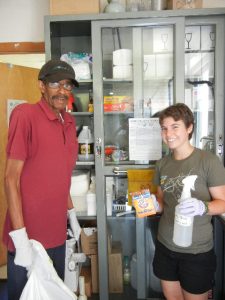Guest Blogger Orly Stampfer, Global Links SCA Green Cities Fellow, reflects on recent changes that reduce our environmental impact at work. Read more about Global Links’ commitment to the environment and sustainable practices here.
At Global Links, every day we work towards our dual mission of improving global health and promoting environmental stewardship. These goals not only guide our work, but also influence everyday practices and are evident in our attitudes. Because health of the planet and health of people are intertwined, often making one positive change can benefit both pieces of our overarching objective.
One such positive change is a recent switch to eco-friendly cleaning products. A project of the newly formed Green Team, this is just one of the ways we put our green attitudes into practice. As stewards of the environment, we need to be conscientious of what chemicals we are releasing into the air and down the drain into our waterways. And again, it’s not just about being green – many chemicals dangerous to the environment are also dangerous to human health.
As we consider what happens to the products we use, the importance of green cleaning becomes clearer. Whenever we dump detergent into the dishwasher or laundry machine, wash our hands and dishes in the sink, shower, hose down our cars, flush cleaners down the toilet, or wash our mops and rags, everything that we clean off and all of the cleaning agents we used are flushed down the drain or into the sewer. Out of sight, out of mind? That is a dangerous and shortsighted attitude.
Pittsburgh, along with other older cities, uses a combined sewer system. Sewage water and storm water are combined into the same pipes and sent to the same water treatment facility. When it rains, the flow exceeds the capacity of the transport pipes and the treatment facility, and the excess is released into water bodies untreated. That means all of the chemicals and materials that go down the drain, down the toilet, or out into the street can end up in our rivers completely untreated. The raw sewage is of course a major concern – and so are all of the chemicals released.
How about when it’s not raining and all the wastewater does get treated? In that case, all debris, particles, and grease are removed, and pathogens are killed. Typical wastewater treatment does not include removal of chemicals, though EPA water quality standards for discharged water do exist. The process is similar for drinking water: EPA standards exist, but treatment does not involve removal of many of the chemicals found in cleaning products.
In the Pittsburgh region we have an abundance of fresh water, and are not forced to obtain drinking water out of the same rivers we pollute. However, polluting chemicals will eventually end up in the ocean, in the food chain, or in soil. There is no telling exactly where a toxin will go once it’s released into the environment – but it will go somewhere. It will certainly not disappear. These chemicals are on the loose, and they’re damaging to our health and to the earth.
With this information in mind, we at Global Links are ditching regular cleaning products as much as we can, and switching to ones that don’t contain dangerous chemicals. When possible, we opt for homemade cleaners. For example, we now use a mixture of vegetable oil and vinegar for wood polish, and we clean the windows with vinegar.
So lose the chemicals and stock up on baking soda, vinegar, lemon juice, and oils. They will surprise you with their cost-effective green cleaning abilities, and they won’t make you cringe when they swirl down the drain.

